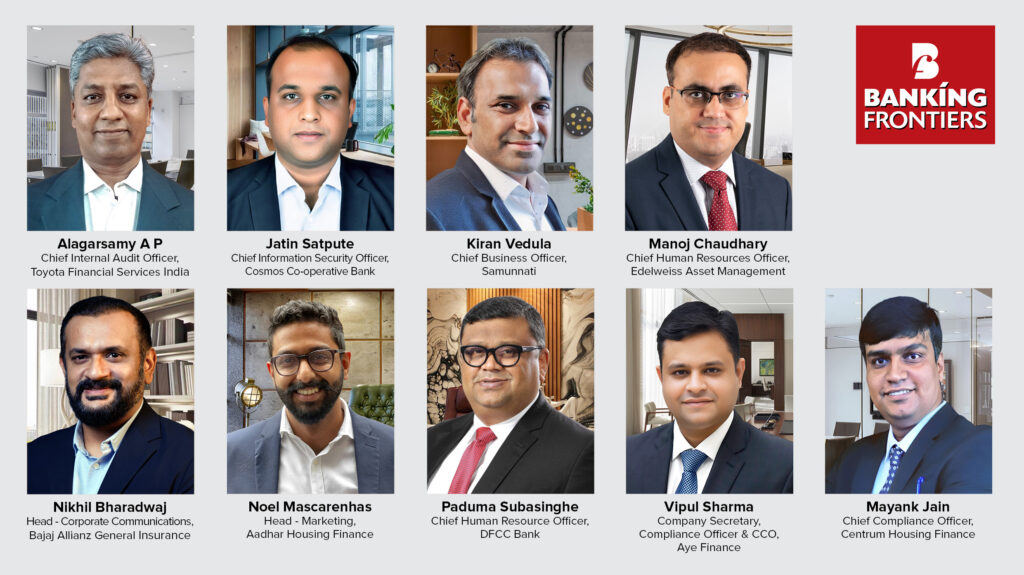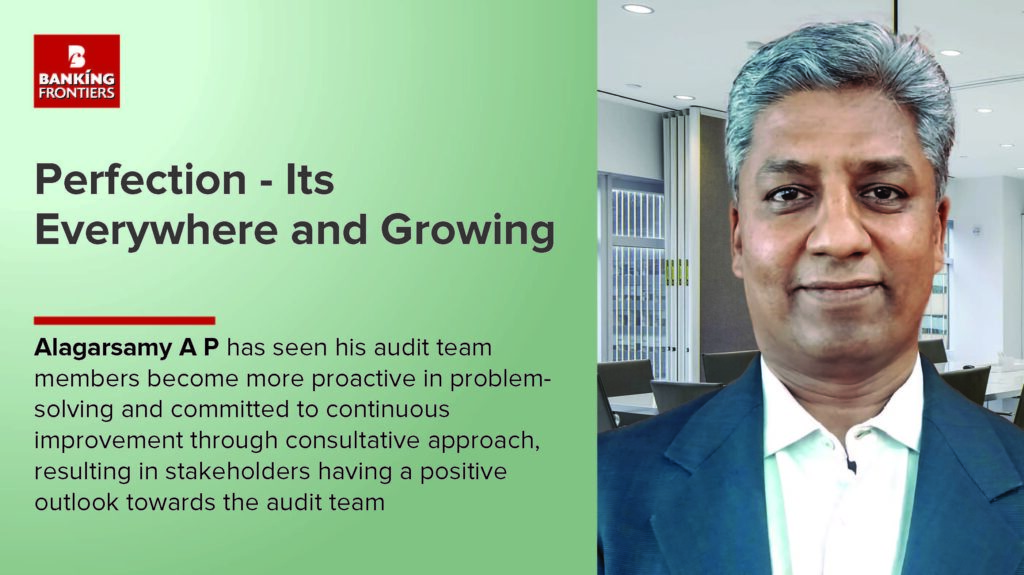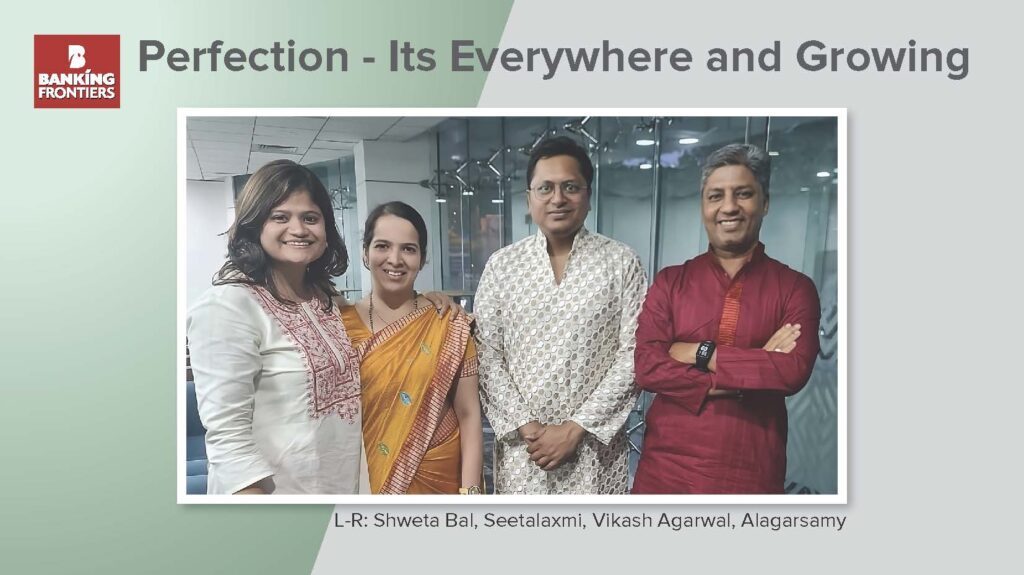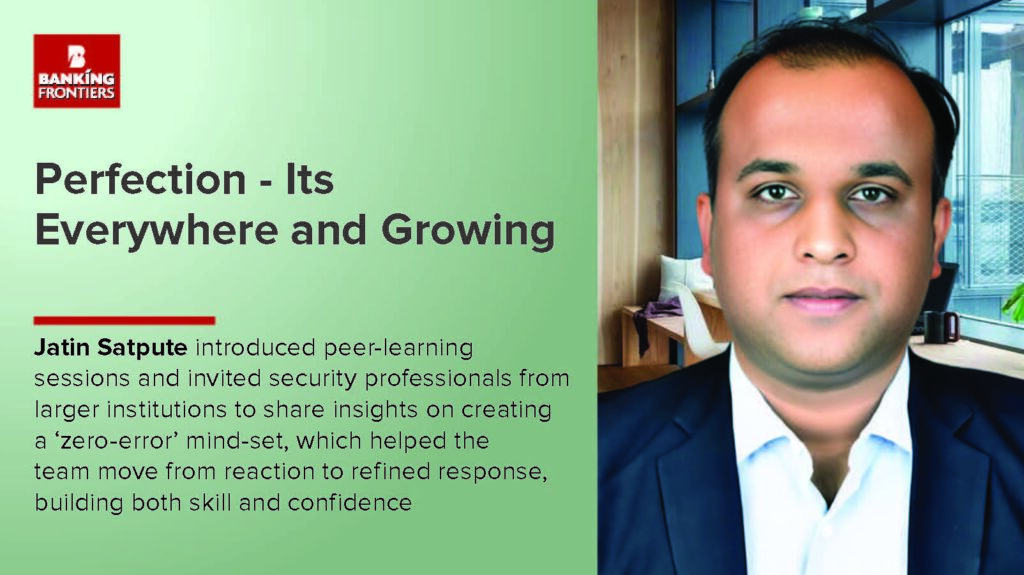
Check out the evolution of perfection in different functions in BFSI organizations, the forces driving the changes, and the outcomes achieved. Participants also share some details about the size and skills in the associated team.
In the marketing/corpcomm domain, 2 vectors are nudging the shift towards perfection. The first vector, as pointed out by Noel Mascarenhas, is the shift in emphasis from creativity to tech driven targeting and advertising. “With the rise in competition and need to understand the end audience, it is important for us to land every campaign perfectly,” he explains.

Nikhil Bharadwaj explains the second vector: “Perfection has now become essential, particularly in the context of crisis management. The growing influence of social media and the widespread nature of misinformation have significantly increased reputational risks. In such an environment, even the slightest lapse in response time or factual accuracy can severely impact an organization’s image.”
Accordingly, Nikhil is focused on swift, accurate, and well-structured communications. His in-house team comprises 10 professionals, including 5 members dedicated to external communications and reputation management. He adds: “We function without the support of an external public relations agency. The team brings together diverse capabilities, ranging from strategic media relations to real-time content development. This allows us to respond promptly, manage crises effectively, and precisely protect the organization’s reputation.”

Compliance
In the compliance domain, earlier there was little need for perfection, just meeting basic regulatory requirements was sufficient. However, India’s regulatory landscape has evolved rapidly, and the expectations have grown significantly. Vipul Sharma asserts that today, compliance demands a proactive, precise, and deeply ethical approach to ensure trust, transparency, and long-term sustainability.
Mayank Jain adds that increasing complexity of the regulatory landscape, coupled with heightened scrutiny from the Reserve Bank of India (RBI) and other authorities, has made absolute accuracy and thoroughness paramount. Any oversight or minor error can now lead to significant financial penalties, reputational damage, and even regulatory action. The compliance function at Centrum Housing Finance at has professionals with diverse skill sets including legal expertise, risk management, audit experience, and a deep understanding of the housing finance sector.
At Aye Finance, the compliance team has grown to a mid-sized group of around 5-7 professionals, with expertise spanning regulatory frameworks, listing and data governance. They possess strong analytical skills, sound judgment, and a deep understanding of industry regulations and standards. Adds Vipul: “We’ve focused on upskilling the team, adopting technology for better monitoring, and fostering a culture of accountability and continuous improvement.” Vipul sees perfection in compliance as a business imperative that builds resilience and maintains the trust of stakeholders.
Audit
Alagarsamy A P gives the perfection perspective for the audit function. He begins by explaining that internal audit is expected to provide an independent, objective, and reasonable assurance that an organization’s governance, risk management, and internal control processes are operating effectively. It achieves this through sampling and testing, which means it may not detect every single error or weakness, and hence it is not perfect. However the expectation from internal audit is to strive for high quality and meticulous work, which aligns with some aspects of perfectionism. This has become more pronounced now with the increased regulatory focus on the role of internal audit in banks and NBFCs. In a critical function like internal audit, perfection/excellence is no more an option but a must, asserts Alagarsamy, who has 16 years of experience in audit.
Personally, he prefers to use the word excellence rather than perfection as perfection is like a mirage – something that is difficult to achieve. He relates this to the famous American football coach Vince Lombardi who said: ‘Perfection is not attainable. But if we chase perfection, we can catch excellence’. Alagarsamy also quotes the famous painter Salvador Dali who humorously said: ‘‘Have no fear of perfection, you’ll never reach it.”

Security
Jatin Satpute explains the past and present scenario for security in respect of perfection: “Earlier, basic regulatory compliance and reactive risk handling were considered sufficient in the cooperative banking sector where the cybersecurity approach was largely reactive, limited to patching systems and checking compliance boxes. Today, both regulatory compliance and the performance of our Security Operations Center (SOC) demand an exceptionally high level of precision and proactivity.”
Jatin leads a lean team of 15 professionals, skilled in log analysis, incident triage, audit response, vendor coordination, information security, IT governance, audit coordination, and cybersecurity operations. The recently strengthened SOC plays a central role in 24×7 threat detection, incident response, log monitoring, and coordination with IT teams during security escalations. The team also collaborates cross-functionally with IT, audit, and other operational teams for broader implementation.
In contrast, earlier, precision wasn’t always prioritized due to limited coordination across departments and relatively relaxed regulatory expectations. However, with increasing digital adoption, rising cyber threats, and stricter regulatory oversight from the RBI, perfection in compliance and incident handling has become non-negotiable, asserts Jatin.
Human Resources
Everyone understand that perfection is about being flawless. Manoj Chaudhary offers an interesting variation to that. He says, it’s about being trusted, especially in the context of the mutual funds industry, which does not sell a product – it is managing people’s savings, aspirations, and futures. Says Manoj: “That places a huge premium on trust and it means that every function including investments, operations, sales, risk, compliance product, marketing, HR needs to reflect discipline and dependability.” He calls this a cultural signal.
The HR team at Edelweiss Asset Management is structured into specialized verticals like compliance, talent acquisition, L&D, and employee experience. They bring a mix of legal, operational, behavioral, and strategic skills to the table. They partner with teams across the organization to bring agility without compromising accuracy.
In recent years, talent management at DFCC Bank has undergone significant transformation, shifting from operational HR focus to a strategic business enablement. Historically, perfectionism was not considered mission-critical in this domain, timeliness and compliance sufficed, explains Paduma Subasinghe.
Today, the talent market is fiercely competitive and attracting high-caliber professionals is a growing challenge. This is accentuated by the demand for high retention, the prioritization of employee wellbeing, and the emergence of an increasingly GenZ-centric workforce that values purpose, flexibility, and authenticity. So, the HR team at DFCC Bank is no longer just filling roles, it is actively forecasting talent gaps, optimizing workforce deployment, and aligning talent capabilities with the bank’s long-term strategic goals. This requires precision, foresight, and data-backed decision-making, all of which demand a perfectionist approach.
The bank’s talent management team is composed of 7 managers and 14 executives, skilled in workforce planning, employer branding and leadership and technical development. Over time, their skill sets have evolved from administrative functions to agile execution, data literacy, strong business acumen, and digital fluency.
Business
Finally, let us look at perfection from the eyes of a business head – Kiran Vedula. He explains: “Credit underwriting and risk evaluation is one function where the expectation of perfection has grown exponentially in recent years. Traditionally, this area had allowed for some qualitative judgment and field-level flexibility. While this flexibility allowed us to extend credit to underserved segments, it also meant a certain tolerance for subjectivity.”
In pursuit of perfection, Samunnati has co-developed an FPO Grading Tool in partnership with CRISIL, integrated API-based auto-fetching of customer details into its LOS and credit systems, and implemented automated Business Rules Engines (BREs). The Credit Appraisal Memorandum (CAM) generation is now largely automated, freeing up resources’ time while increasing accuracy and speed. The associated team has evolved accordingly – today, it comprises over 20+ professionals with skills across credit analysis, agri-economics, and sector-specific expertise.
Conclusion
To sum up, multiple factors are driving perfection – regulation, internal expectations, customer expectations, costs, competition and more. The common factor clearly is that perfection, which was not essential hitherto, has now become a must. Accordingly, all future plans that an organization makes will have to take perfection as a non-negotiable KPI. If your organization does not have perfectionism as a KPI, it is time to do so.







